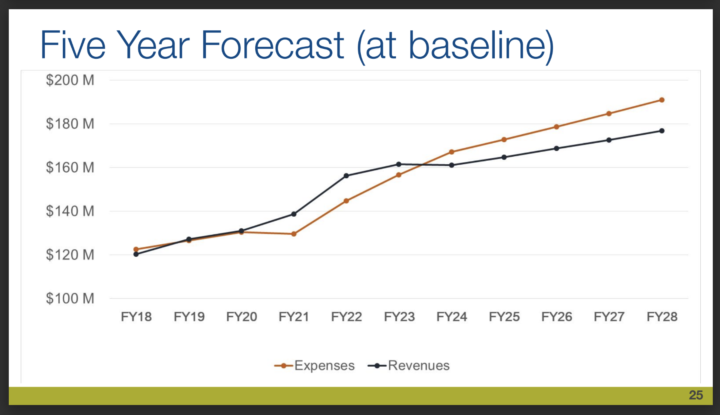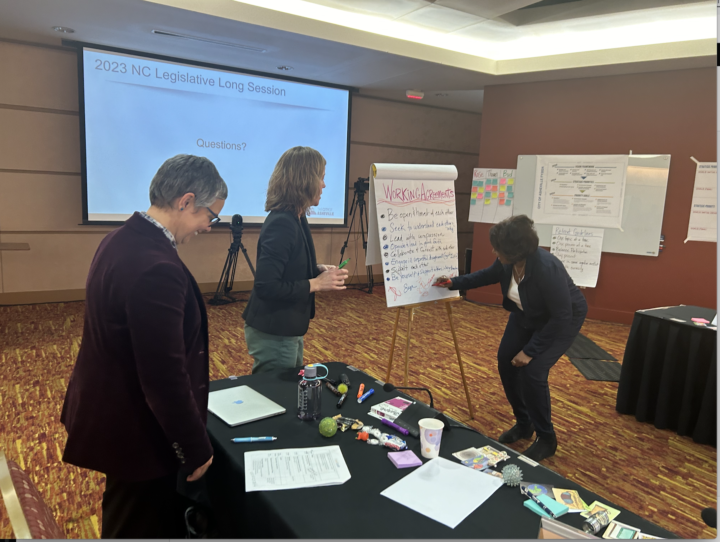“First off, there are toys,” said Asheville-based event facilitator Amy Climer, pointing to the brightly colored balls and figurines littering the tables where members of Asheville City Council and city staff gathered for their annual retreat. “They’re there for you to fidget with so you don’t have to feel attracted to your phone. You can just pick up a little ball; it works remarkably well.”
Several Council members and staff took up Climer’s offer and were seen rolling, squeezing and stacking the objects over the course of the two-day event held Feb. 22-23 at the Harrah’s Cherokee Center — Asheville.
Distractions aside, Council members got down to business as they worked through the arduous and, at times, tense process of forging its goals for the upcoming fiscal year.
Xpress rounded up four takeaways from the event.
Staying the course
Rather than developing new strategic priorities, Council members chose to build on and refine six priorities first developed in 2022: equitable, affordable housing and stability; homelessness strategies; improving core services; neighborhood and climate resilience; reimaging public safety; and reparations. 
This year, Council added “maintaining infrastructure” to improving core services, noting that it wanted to “prioritize and increase investments in municipal assets.”
“It’s been really helpful, resulting from the last two retreats, that we’ve had continuity on the priorities that Council has provided,” noted Assistant City Manager Rachel Wood. “That common thread has given us that constant so that we know where you want us focused, and we really appreciate having that continuity.”

Unlike last year, Council members did not create specific projects and implementation strategies for city staff to follow. That approach proved cumbersome after Council found itself revisiting the issue in a work session in June. 

City Manager Debra Campbell added that despite several issues that the city experienced last year — including the aftermath of a citywide water outage and public relations blunder, the implosion of a city-funded permanent supportive housing project at an East Asheville Ramada Inn and the resignation of the city’s fifth police chief in 12 years — it had made significant headway on several projects and goals.
According to a presentation by staff, the city’s accomplishments included a 60-day downtown safety and cleanliness pilot, which morphed into ongoing services; completion of the Stop the Harm audit for the Community Reparations Commission; and creation of the Missing Middle Housing study to identify how zoning can hamper affordable housing.
“I wish that I could say that we had a pretty easy year last year, but it wasn’t. …There were a number of things that significantly impacted our organization,” said Campbell. “We endured and overcame those peaks and valleys. And we feel that we made steady progress, especially as it relates to housing, public safety and some of our core services.”
In the red
City Finance Director Tony McDowell and Budget Manager Taylor Floyd explained that while the city had enjoyed a surplus in its general fund the last few years, expenses are projected to outpace revenues starting in fiscal year 2025 — and continue over the following five years.

McDowell explained that a combination of conservative spending during the pandemic and strong sales tax revenue, which makes up about a quarter of the city’s general fund revenues, contributed to higher-than-usual general fund balances for fiscal years 2022-24.
The surpluses allowed the city to provide a 5% pay raise for all city employees and a 6% raise for sworn Asheville Police Department officers, among other investments.
Keeping pace with those investments will be challenging in the coming years, added Floyd. He attributed the shortfall in part to a plateau in the city’s sales tax revenue.
“What do you theorize is the major swing in sales tax? Is it visitors and tourism?” asked Council member Sage Turner.
“I think some of it is just totally natural softening after many years of spending and inflation,” McDowell responded. “I wouldn’t say it’s directly related to tourism being down; perhaps it is a little bit. But it’s not just Asheville, it’s statewide. Interest rates have been increasing as well; that might be slowing down some business spending a little bit.”
Both Floyd and McDowell said that staff will likely recommend fee increases for city services, such as stormwater.
The city already held one work session on the city budget in December and released an online survey aimed at gathering public input. The next budget work session is scheduled for Tuesday, March 26, with final adoption of the budget slated for June.
Ready, set, GO
Given slowing revenue and the growing list of funding needs, Council reiterated its support for a multimillion-dollar general obligation bond referendum in November. Asheville voters last approved three city bonds in 2016, totaling $74 million for transportation, affordable housing and parks projects.
The proposed bonds would fund projects related to housing, transportation, parks and recreation improvements, public safety facilities and other investments, though specific projects have yet to be identified.
During the retreat, Council members were presented with three options for the bonds. One option would give voters the chance to approve the entire amount in a single vote. A second would divide the amount into two referendums, one in 2024 and another in 2028 — or a third option, splitting the amount into thirds in 2024, 2026 and 2028.
The process requires several votes from Council. In May, Council is expected to vote on a notice to apply for the bonds, and a second, likely in June, will specify the pacing of issuing those bonds and schedule a public hearing, which would be held in July.
If approved by Council, the referendum will appear on the general election ballot on Tuesday, Nov. 5. Council will set the tax rate in June 2025, based on Buncombe County’s 2025 property tax revaluation.
The city’s bonds will be atop those Buncombe County voters approved in November. The two bond measures address affordable housing and open space conservation. Combined, those bonds totaled $70 million and are expected to cost the median household about $32 per year in additional taxes over 20 years.
Playing nice

The event also allowed Council members and staff to reflect on how they worked together as a team. In a few instances, Council discord has spilled into the public. In 2022, Council member Sheneika Smith accused an unnamed member of Council of leaking information to the public about a proposed ban on food distribution in city parks. Council later dropped the idea. In August, an open letter regarding the city’s response to public safety and homelessness was signed by all members of Council except Council members Kim Roney and Antanette Mosley.
At this year’s retreat, however, Council members and city staff tended to agree that they had entered a flow with one another. Event moderator Climer asked Council members to tweak a list of 14 agreements created in 2021 aimed at ensuring respectful communication. All seven Council members signed a document committing to this year’s agreements, which included pledges to “lead with compassion” and “engage in respectful disagreement,” among others.
“I’ve watched this Council come together and work together. [We’ve] sort of brought the pieces together, whereas before, I felt everything was sort of scattered,” said Vice Mayor Sandra Kilgore, whose term ends this year and who is not running for reelection. “We just had a lot of things going on. But I’m watching this Council come together and put these puzzle pieces together, and I’m proud.”
“It has not always been the case that we’ve been the best communicating body,” added City Attorney Brad Branham. “I think this has improved considerably.”



Amazing that Asheville’s highly unrepresentative (and obviously not diverse) council continues staring overspending in the face yet never considers refocusing on essential city functions. Instead they spend the time playing with toys and making niceness pledges.